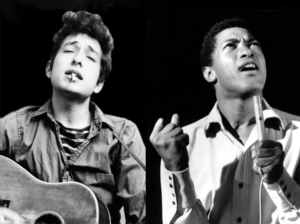 His Biggest Hurdle Now Behind Him, Sam Cooke Looks Toward the Adult Market
His Biggest Hurdle Now Behind Him, Sam Cooke Looks Toward the Adult Market
MUSIC BUSINESS — (7/11/1964) — The young and talented in our time face a depressing reality. The very mass media which serve to promote and parade them before the public (press, radio, television, recordings) play a double role: they are also the harbingers of obsolescence. The “too much, too soon” machinery has a will of its own, and few understand the mechanics of escaping it. Hopefully, Sam Cooke does.
At 29, Cooke can already look back on seven exceptionally successful years in show business. A graduate of one of the finest gospel singing groups, the Soul Stirrers, Cooke’s first single hit as a soloist was his self-penned “You Send Me,” which appeared on the Keene label. Shortly thereafter he was signed by RCA Victor Records and his career slowly took shape. And it is a solid shape. His last ten singles have all made Top 20 in the country.

Long term success is rarely an accident. For Cooke, it has been a case of meticulous planning, and a constant need on the part of the artist for reappraisal of his abilities – particularly as a live performer. “I remember my first stab at the Copa. I had just two hit singles and was booked as a second string act. I wasn’t prepared. I had no conception of an act, lacked stage presence and made little identity with lyrics. It was a painful lesson.”
Others who recall that particular date are easier on Cooke than he is on himself. But he vowed then he’d be a pro before he returned.
When he opened there, June 24, as head-liner, there was something of a vengeance in the first half of the opening set. He was tight and visibly nervous. But then, the real Sam came through and he had his audience with him from there on in – even to singing and clapping while he fed them the lyrics to “If I Had A Hammer.” A pretty risky trick for the staid Copa crowd — but it worked. Cooke has finally broken into the adult market, and he intends to stay there.
Yet there is something enigmatic about Cooke’s past five years as a performer. He has been virtually protected from the adult market, which is hard to reconcile in this day and age. All the while, he has had a tremendous teen following, and the Negro community know him as a “star.” At New York’s Town Hill, for instance, he earns $12,500 per week as a headliner.
When he plays the Apollo in Harlem he breaks attendance records (52,000 his last week there). Yet, his manager of nine months, Allen Klein, when asked why he’d waited so long for the Copa booking, he explained, “Frankly, they didn’t want him. ‘Who’s Cooke,’ they asked. His current booking there wasn’t even set until May.”
Klein has ambitious plans for Cooke’s future, with murmurs of a Carnegie Hall concert and the Greek Theatre in Los Angeles, as well as the European scene. Cooke recently left the William Morris Agency and signed with G.A.C., where Buddy Howe is in charge of him. “Howe’s one of the best talent builders in the business,” offers Klein.
Klein explained, “We’re ready to go all the way with Sam. This past year has been a brief hiatus for Sam — he’s not given any personal appearances, save one, so that he could orient himself to the change in his career. Now we’re set to run with it.”
If Cooke’s business acumen is any indication of his talent for carrying things out, there’s little doubt that he’ll make his presence felt. He owns his own publishing firm (Kags) and two record labels, Derby and Sar. As a composer, he’s been responsible for most of his hit record tunes, including “You Send Me,” “Every-body Likes to Cha Cha Cha,” “Only Sixteen,” “Chain Gang,” “Having A Party,”“Cupid,” “Twistin’ The Night Away,” “Another Saturday Night,” “Ain’t That Good News,” and “Good Times,” is just a partial list. And it is intimated that his recent new pact with RCA Victor has some pretty interesting clauses in it. One is that as he develops new talent on his own labels, Victor gets first refusal on signing the acts.
 If Cooke has any idol it is talent. He is ecstatic about great performers, arrangers, writers. He spoke recently at length about Bob Dylan. “Now there’s a guy with a real soul. And such a talent for putting beautiful thoughts in a simple framework. If you’ve got something to say, I think that’s the way to say it. If you haven’t you’d better cool it.
If Cooke has any idol it is talent. He is ecstatic about great performers, arrangers, writers. He spoke recently at length about Bob Dylan. “Now there’s a guy with a real soul. And such a talent for putting beautiful thoughts in a simple framework. If you’ve got something to say, I think that’s the way to say it. If you haven’t you’d better cool it.
“You know,” he confessed, “I was so impressed with one of his songs (‘The Times They Are a-Changin’), I wrote one around it, called ‘A Change Is Gonna Come’ “. END
_______________
Information, credit and news source: Music Business; July 11, 1964
![]()
